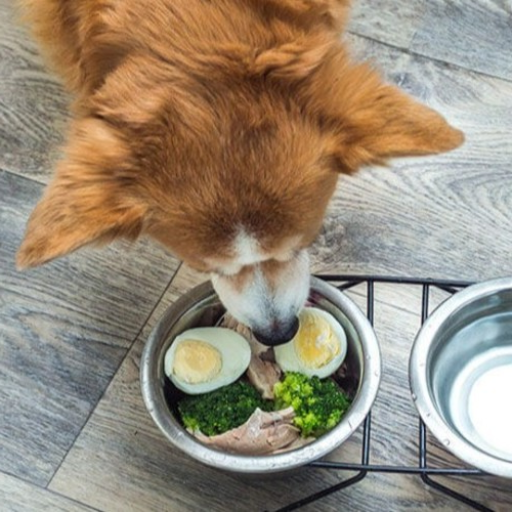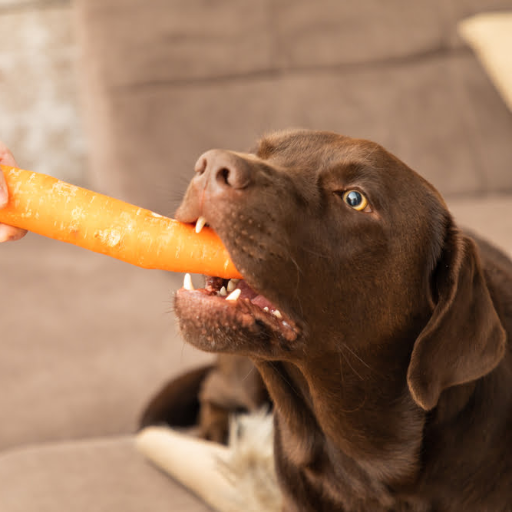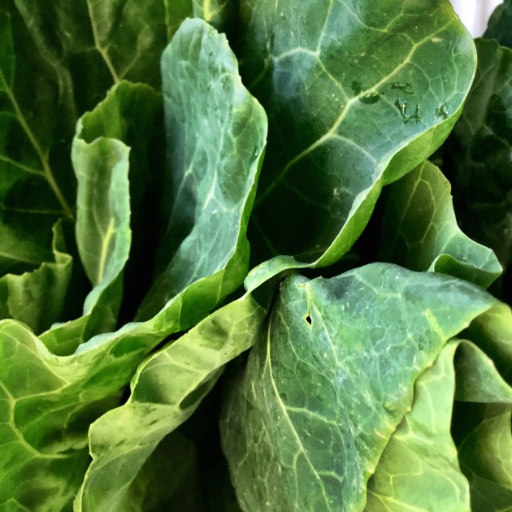For a long time now, eggs have been recognized as a nutritional powerhouse for humans; however, what about our beloved pets? Knowing how many eggs a dog can eat safely per week is a concern quite a few dog owners share. Although eggs may offer crucial nutrients such as proteins, vitamins, and healthy fats, there is a correct protein balance that must be maintained for your pet to be truly healthy and content. This article discusses the benefits and possible dangers of feeding eggs to your dog, identifies portion sizes, and answers the much-debated question on how many eggs are too many. This document will assist novice and expert dog owners in making well-founded decisions regarding their pets’ meals.
Is It Safe for a Dog to Eat Eggs?

Yes – a dog can eat eggs provided they practice moderation. Serving eggs can enhance your dog’s overall health since they include proteins, essential amino acids, and various vitamins. Nonetheless, to minimize exposure to dangerous bacteria such as Salmonella, eggs should be served well-cooked. As with any food, eggs should never form the basis of your dog’s diet. If you are unsure about the serving size tailored to your dog’s age, size, and diet, consulting a veterinarian isa good place to start.
Are Dogs Allowed To Eat Eggs?
Provided that moderation is practiced, ‘**yes**’ is the simple answer. As is the case for humans, dogs too benefit from a well-balanced diet, and properly prepared eggs should be included in your dog’s staple foods. As with humans, dogs enjoy riboflavin, iron, and selenium oily proteins, vitamin A and B12 makers. Actually, cooked eggs can help support good skin and a glossy coat while at the same time helping tissue build and repair.
Nonetheless, there are critical considerations to take. There are potential dangers associated with feeding raw eggs to dogs, such as exposure to pathogens like Salmonella which leads to an upset stomach and, at times, more severe illnesses. A 2021 study published in Veterinary Medicine and Science found that 18% of raw egg samples were contaminated with Salmonella, stressing the significance of proper cooking before feeding pets.
Moderation is especially crucial when introducing eggs into a dog’s diet. For example, large eggs provide 70 calories, 6 grams of protein, and 5 grams of fats. Excessive calorie consumption may lead to weight gain. Small dogs may benefit from half an egg two to three times a week, while larger dogs can occasionally have one whole egg. Always consult your veterinarian to customize suggestions based on your dog’s weight, activity level, and medical history.
In conclusion, with proper handling and serving practices, and in conjunction with a well-rounded meal plan, eggs can be an excellent addition to a dog’s diet.
Understanding the Benefits of Eggs for Dogs
Feeding dogs eggs is a nutritious choice as it provides health benefits when given in the right amounts and properly cooked. It is notable for providing high-quality protein that is vital in muscle development and recovery. Eggs also have important vitamins and minerals such as Vitamin A, B12, riboflavin, selenium, and iron, which are important for the general well-being of your dog. The fatty acids in eggs help maintain a dog’s coat to be healthy and shiny. In addition, lutein, which is an antioxidant present in egg yolks, has benefits for the dog’s eyes.
In a study conducted recently, an average sized egg is said to have 70 calories and 6 grams of protein. Furthermore, the egg has 5 grams of healthy fats which aids in energy provision as well as nutrient absorption. For these reasons, eggs should be regarded as an excellent supplement in a dog’s diet. Nonetheless, note that raw egg whites have avidin which can interfere with biotin leading to the dog developing flaky skin or coat. Cooking the eggs eliminates this problem which guarantees that biotin is readily available for the body to use.
Adding a cooked egg to a dog’s meal one or two times a week can provide a boost in protein while improving the skin and coat condition of the dog. Eggs are also recommended for underweight dogs as it is an easy way to help gain weight due to the high amount of calories and nutrients.
Dogs can only be fed fully cooked eggs that are fresh to avoid foodborne illnesses like salmonella, so care must be taken when serving them. Also, the portion must be adjusted based on the dog’s weight and activity level. A dog’s overall vitality can be positively affected by the proper use of eggs in a balanced diet. Changes in the dog’s nutrition requires consultation from a veterinarian.
Introducing Eggs to Your Dog’s Diet
The first time your dog tries a new food, it is best to start with a small amount so you can observe their tolerance and wait for any possible allergic responses. You can begin by offering a small portion of scrambled or boiled eggs with no butter or oil. Pet Nutritionists estimate that eggs are a great addition as they give a medium sized egg which has roughly 70calories, 6g protein and 5g fat , to a dog’s meal plan.
Studies have shown that eggs are a great source of amino acids, and Vitamins A and B12, iron and selenium as well. These nutrients are essential to help muscles develop, improve coat condition and assist in the proper functioning of the immune system. Controlling portions is crucial as well, as the dog may gain weight because of too many calories. Small dogs will benefit from half an egg a few times weekly, and larger breeds may tolerate a whole egg.
As with any new food, monitor closely for reactions if your pet has a history of eating disorders or sensitive stomach issues. Should you notice any signs of an upset stomach—be it diarrhea, vomiting or even itching—cease feeding them eggs, and contact your veterinarian immediately. A dog’s diet should be well-rounded and balanced using a variety of healthy protein sources to ensure their body receives optimal nutrition.
How Many Eggs Can a Dog Eat?

Eggs can be included in a dog’s diet but not without limitations. For most dogs, one or two eggs each week works well as a treat or an addition to their primary diet. Too many eggs can create an imbalance in their overall nutrition or upset their stomach. Always check with a veterinarian to determine the best quantity for their diet, considering specific needs and requirements.
Recommended Amount of Egg for Different Sizes of Dogs
A dog’s age, activity level, and size all affect how much egg it can safely eat. The following outlines approximate amounts of cooked egg that can be fed to dogs by size:
- Small Dogs (up to 20 lbs): Approximately one small egg weekly, divided over several days.
- Medium Dogs (20-50 lbs): Up to two eggs in a week, but served in separate meals.
- Large Dogs (Over 50 lbs): 2-3 eggs weekly, distributed over several meals.
To minimize the chances of salmonella and ensure digestibility, eggs should be boiled, or scrambled without oil, salt, or other seasonings. Like any new food, eggs should be introduced gradually to monitor for negative reactions such as allergies or digestive issues.
Can Excessive Egg Consumption be Damaging for Your Dog’s Health?
Even though eggs can be a highly nutritious supplement to your dog’s diet, overconsumption can lead to some serious health issues. With eggs included as part of their meals, a dog’s diet needs to be properly balanced. A veterinary expert also noted that excessive feeding of eggs can lead to obesity on account of its calories. In fact, one large egg contains roughly 70 calories. For smaller dogs this can be a huge number and exceeds their daily recommended caloric intake.
Moreover, an imbalance can be created from excessive feeding. Eggs are high in cholesterol. If too many eggs are fed, dogs sensitive to dietary changes can face upset digestion, or more severe cases of pancreatitis. Aside from this, raw eggs, which are typically frowned upon, do outweigh any possible benefits, raw eggs do pose the risk of salmonella and a biotin deficiency, although the latter is rather uncommon.
As per the recommendations of a veterinarian, treats such as eggs shouldn’t exceed 10% of calories given to your dog on a daily basis. To illustrate, for a dog who’s intake is 500 calories, eggs should provide no more than 50 calories worth. For personalized guidance on the number of eggs appropriate for your dog, considering factors like weight, size, and activity levels, a veterinarian’s advice is recommended.
how often should you feed eggs to your dog?
This completely depends on a dog’s weight and daily calorie intake. In general, smaller dogs can benefit from receiving half an egg one to two weeks. In comparison, larger dogs might be able to push 1 whole egg in about the same time period. Recent data suggests the nutritional value of eggs as 70 calories, 6 grams of protein, and 5 grams of fat which is good in moderation but not if given in excess.
In addition, one should always cook eggs thoroughly prior to serving them. The consumption of raw eggs poses the risk of salmonella or biotin deficiency, the latter of which primary occurs when a protein known as avidin, present in raw egg whites, hampers biotin utilization in the body. Cooking the eggs significantly reduces these risks.
For a 50-pound dog with a caloric requirement of about 1,200 daily calories, one egg per week would add less than 6% of their weekly caloric intake. This sits comfortably under the the suggested cap of 10% of daily calories set for treats or supplements. For dogs of varying size or activity level, these portions should be adjusted proportionally to maintain proper nutrition and health. For any dietary changes, always consult the veterinarian to ensure optimal care for the pet.
Should Dogs Eat Raw Eggs?

While dogs can have raw eggs, there are risks associated with feeding them to dogs. Dogs can develop ailments from harmful bacteria such as Salmonella. Also, a dogs diet that consists of raw eggs fed regularly would lead to a biotin deficiency due to abundant avidin present in egg whites. If you are considering feeding eggs to your dog, cooking them would be a safer option. Always check with your veterinarian before introducing new foods like raw eggs into your dog’s diet.
The Dangers of Feeding Dogs Raw Eggs
I recommend not feeding raw eggs to dogs as the dangers exceed the benefits. The possibility of Salmonella contamination poses risks to both the pet and owner. In addition, the raw egg white containing avidin can lead to Biotin deficiency over long periods. To prevent these problems, cooking the egg is a better option while seeking guidance from the veterinarian is beneficial when tailored to your pet’s needs.
Substitutes for Raw Eggs for Dogs
Dog’s raw eggs can be substituted with an equally nutritious choice of foods such as cooked eggs. Eggs serve as easy the dogs to scramble or boil. Eggs should be scrambled, or boiled, as this completely alleviates the Salmonella risks. Furthermore, during cooking, avidin is neutralized.
The previously mentioned dishes also contain lean chicken, turkey, and beef that are rich in protein and other nutrients. Recent studies estimate cooked fish, especially salmon or sardines for their high omega-3 fatty acid content, aid in coat and skin health. Omega-3 greatly reduces inflammation, and these fish are other lean meats are great sources of top tier protein.
For vegetarians, low-sugar yogurt and cottage cheese help in digestion due to the calcium and probiotics. These should be yogurt should not contain flavoring and should not contain sugar. Pumpkin helps eliminate digestive issues by providing essential fibrous material along with vitamins A, C, and E.
Research additionally shows that blueberries, apples (without the seeds), carrots, and spinach qualify as dog-friendly fruits and vegetables and can greatly enhance their diet. When given in appropriate amounts, these fruits and veggies can provide your dog with additional antioxidants, vitamins, and dietary fiber.
It’s very important to talk to a veterinarian beforehand when it comes to modifying your dog’s diet to ensure that any new food aligns with the recommended dietary habits tailored to your dog’s specific health problems, if any.
How to Prepare Eggs for Dogs?

To minimize health risks of harmful bacteria such as Salmonella when preparing eggs for your dog, frying, boiling, and scrambling, among other methods that cook the eggs completely, is recommended. Furthermore, adding no oil, butter, salt, or seasoning makes these scrambled, boiled, or even poached eggs ideal. Prior to serving them to your canines, ensure the eggs are fully cooked and do not contain any additives.
Advantages of Cooked Eggs for Dogs
The nutritious eggs offer a plethora of health benefits, helping to maintain proper muscle development and overall health in dogs due to being loaded in essential amino acids which is particularly important for dogs, as they are a good source of protein. Additional vitamins that eggs contain are Vitamin A, Vitamin D, B-complex (like B12), selenium, and iron. Eggs aid in better immune system functionality while improving skin and coat health and increasing energy.
Moreover, recent studies highlight the important role biotin plays by helping with enzyme activity while also aiding fur and claw health; both essential for dogs. Teeth health is important for dogs at all ages and thus, lutein found in egg yolk aids in eyesight and bone health, helping to prevent degenerative conditions.
Based on a 2022 Veterinary Nutrition study, eggs can be an economically suitable protein source for dogs when administered in moderation. As a rule: small and medium dogs can be fed one fully cooked egg daily, and larger dogs can be given slightly more. Care should always be taken to ensure dogs do not exceed their caloric requirements, making them susceptible to weight gain.
Of note, suggested feeding practices should be avoided if raw eggs are being used due to a risk of Salmonella infection and possible biotin deficiency from avidin (a protein found in raw egg whites). All risks are eliminated after cooking eggs thoroughly which ensures safe consumption for your furry friend. Remember to adjust your dog’s diet slowly and speak to your veterinarian to get tailored advice for your dog’s specific needs.
Ways to Cook Eggs for Your Dog
- Scrambled eggs – Cook without salt, butter or any other seasoning to keep scrambled eggs dog-friendly.
- Boiled eggs – Serve best by hard boiling them and peeling off the shell.
- Fried eggs – Like scrambled eggs, fried eggs should be served unseasoned and oil/ butter free.
- Poached Eggs – One of the simplest cooking techniques to ensure a nutritious option is to poach eggs in plain water.
Should Dogs Consume Eggshells?
When expertly prepared, shells from eggs can serve as a great source of calcium and therefore contribute to the nutrition of your dog. Calcium is important in maintaining a dog’s bone structure, dental hygiene, muscular system, and growth. Specialists suggest that one large eggshell can be responsible for approximately 2 grams of calcium which is essential for a good calcium supply. The daily intake of calcium for most of the dogs considering their size and weight is fulfilled by this single eggshell.
With that said, eggshells need to be adequately cleaned beforehand. It is crucial to scrub the shells and boil them to remove any bacteria, like Salmonella. After the shells are cleaned, they can be turned to powder which improves the absorption and digestion process for dogs. This calcium can be safely provided without risk of macroscopic chunks leading to choking, or digestive difficulties by incorporating the powdered eggshell into the dog’s regular food.
Although eggshell powder has its advantages, the consultation of a veterinarian is critical before adding it to a dog’s diet. Pets that are older in age may experience health problems (like calcium imbalances or kidney issues) from taking too much calcium. Always seek the help of a certified professional when altering your pet’s diet.
What Are the Nutritional Benefits of Eggs for Dogs?

From a nutritional standpoint, eggs can be advantageous for dogs. They are a vital source of protein, which aids in muscle development and recovery. In addition, eggs contain other important vitamins such as Vitamin A, which supports skin health , and Vitamin B12, important for energy metabolism. Eggs also have important minerals like iron and selenium, which enhance overall health. Provided eggs are cooked properly to eliminate any bacterial contamination, and served in reasonable portions, they can help round out a dog’s diet.
Essential Nutrients Eggs Provide to Dogs
When eutrotions are properly, eggs can greatly assist dogs due to their numerous health benefits. As per recent studies, large servings of eggs and omelets greatly help pets due to their lean yet powerful 6 grams of protein. This value can enhance the muscles and tissues of boarded pets.. The nutritional value of aids fuels ration will significantly contribute sharpening their alchemical systems.As with all poultry products, eggs are rich in essential fatty acids, including Omega-3s which aid in maintaining luster and a healthy skin. The egg yolk contains a good amount of biotin which is a B vitamin that aids in skin maintenance and minimizes hair loss in dogs. In addition, eggs contain ample choline which aids in boosting brain development and maintaining a healthy liver in dogs.
Other vitamins and minerals which can be found in eggs are Vitamin D which aids in bone development and selenium, which is a strong antioxidant that helps in the immunity system. Studies have also confirmed that eggs have lutein and zeaxanthin which are known for helping vision by preventing macular degeneration.
It is important to note that eggs have to be cooked to eliminate any risk of Salmonella before being given to dogs. Raw egg whites have a protein called avidin which acts negatively by restricting biotin uptake, however, this effect is nullified by cooking. Depending on the size, weight, activity level of the dog, eggs can be given a few times a week with a maximum of serving a few eggs per week. Ensure that a veterinarian is consulted prior to facilitate dietary changes to plan meals that fulfill the precise requirements of the pet.
How Eggs can Her Healthy Additions in Dog Diets
When incorporated into a dog’s diet sparingly, eggs provide a great deal of nutrition value to dogs. Eggs are also rich in proteins, essential amino acids, and fatty acids which assists in muscle development, cell repair, and overall cellular health. In addition, eggs have Vitamin A, B12, riboflavin, and folate which help maintain skin, coat, and immune system of dogs.
Around 70 calories, 6 grams of protein, and 5 grams of fat is the nutrients found in a single medium sized egg. These numbers make carbs and other dense snacks valuable to your dogs. Moreover, eggs are great source of selenium and iron which support metabolic activities and oxygenation in the body. For sensitive dogs, eggs whether boiled or seasoned free scrambled is gentler on their stomach.
More recent studies strongly suggest that incorporating eggs into a dog’s diet can assist in maintaining healthy eye function because they contain lutein and zeaxanthin—antioxidants that help combat oxidative damage and lower the risk of developing chronic eye diseases. Moreover, eggshells can be converted into natural calcium supplements which help in maintaining strong bones and teeth when finely ground and properly sterilized.
As with all dietary practices, eggs should be fed in moderation. For small dogs, a fraction of an egg several times a week can provide adequate nutrition, while larger breeds can safely eat a whole egg two to three times a week. The imbalance of dietary nutrients and excess weight gain are possible risks associated with overeating eggs. To maximize health benefits, always consult with your veterinarian based on your dog’s breed, age, and overall health.
Reference sources
-
Your Dog’s Nutritional Needs – Provides detailed insights into the nutritional requirements of dogs, which can help determine appropriate egg consumption.
-
Safely Feed Your Pup If You’ve Run Out Of Dog Food – Discusses eggs as a nutritional source for dogs and their safety as part of a diet.
-
Inflammatory Bowel Disease and the Home-Prepared Diet – Offers guidance on home-prepared diets for dogs, which may include eggs as a protein source.
Frequently Asked Questions (FAQs)
Q: How many eggs can a dog eat in a week?
A: Dogs may eat eggs, but they should be given in moderation. Depending on the dog’s size and diet, it is best to stay between one or two eggs maximum per week. Every dog is different, so it is best to consult your veterinarian for recommendations on how many eggs to feed your dog.
Q: Are eggs a nutritious treat for dogs?
A: Eggs can be a great treat and dogs of all ages can benefit. Protein, vitamins, and minerals contribute to a dog’s nutritional well-being, and therefore, are highly beneficial to dogs’ health and can help maintain a healthy coat.
Q: Can dog food be replaced by feeding eggs to dogs?
A: Eggs should not be the sole substitute for dog food. While it can serve as a supplement, it cannot be the primary food source. Like all living creatures, dogs need a balanced diet consisting of different food sources.
Q: Is it safe for puppies to eat eggs?
A: A dog egg recipe can be considered dog friendly as puppies can consume eggs, especially when they’re proper with dosage. An egg can only be given after proper checking and boiling as raw servings increase risk. However checking with a vet on the right dosage is recomended.
Q: Should eggs be served raw or cooked to dogs?
A: Dogs consume chicken eggs as well as quail eggs without care of being raw or cooked. However just as other foods, moderation is key when it comes to feeding such as the basic methods in diet.
While considering dog food diet and recipes, chicken as well as quail eggs are good sources of nutrition.
Q: Can dogs eat cooked eggs every day?
A: Zero harm can be inflicted onto the dog due to feeding periods being in check so serving a boiled egg should be within 2 – 3 days a week. Dogs should consume rough food, eggs and anything close to that should most certainly be eaten within reason while sparingly utilizing these goodies shall remain in rule.
Q: Are eggshells safe for dogs to eat?
A: While weak in nature, animals feeding on shells such as quails and chicken eggs is quite common especially where there is a rich abundance of calcium and vitamins can be found without the risk of being adhered to, so with caution. Getting calcium through bone powder or chicken shells surely needs monitoring and if consumed in bits along with hurdles, excess tissue bones, feathers and skin.
Q: What is the best way of integrating eggs in a dog’s diet?
A: You may integrate eggs in a dog’s meal plan by mixing them with the standard food or giving as an occasional treat. It is important that every egg is properly cooked with no addition of salt or oil and served bare of any side dish.
Q: What nutritional benefits can a dog obtain from eggs?
A: Without a doubt, the eggs help provide a protein rich nutrients that assist in maintaing a dog’s coat. Improving the diet by adding eggs helps improve and make the coat stronger, but must be in moderate amounts.









